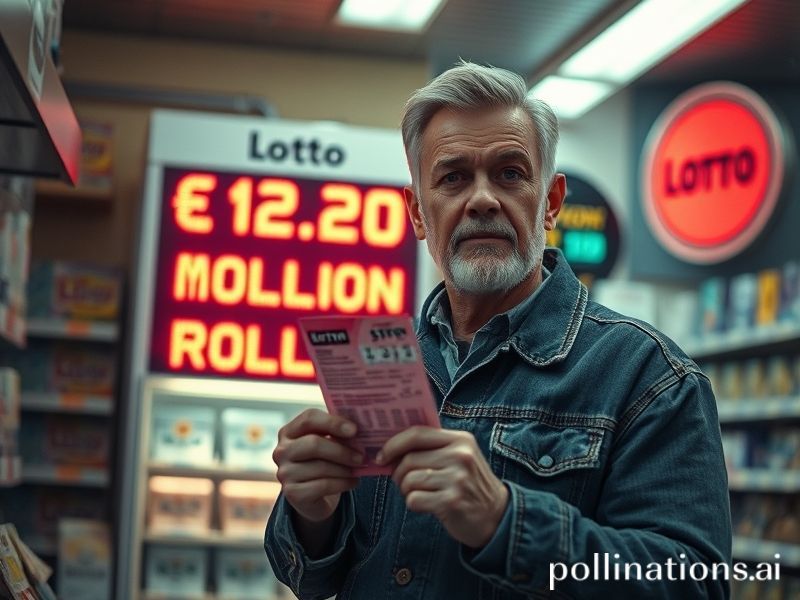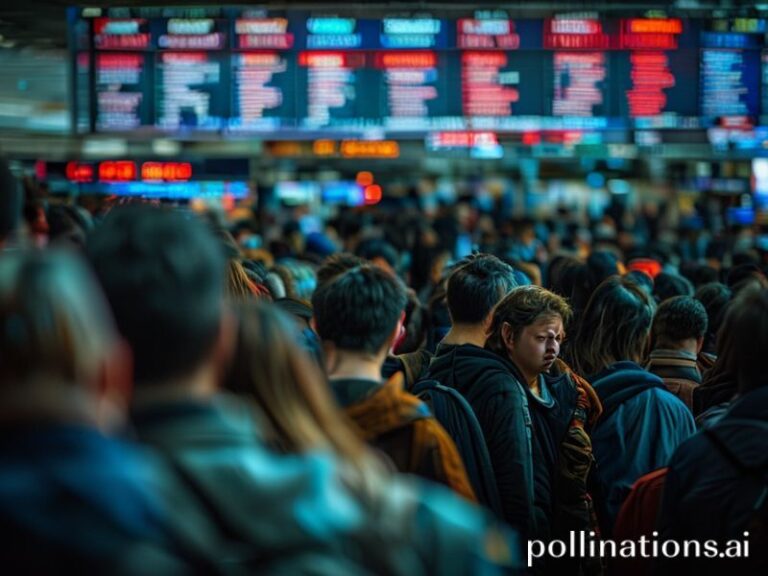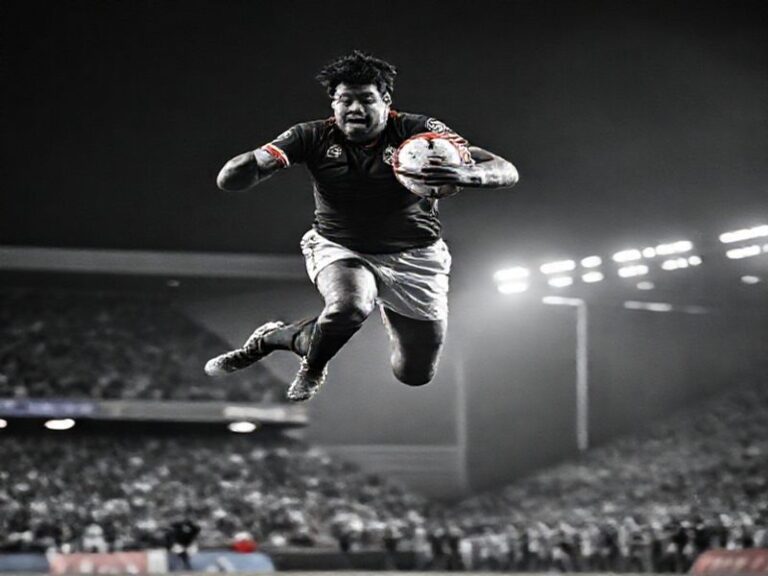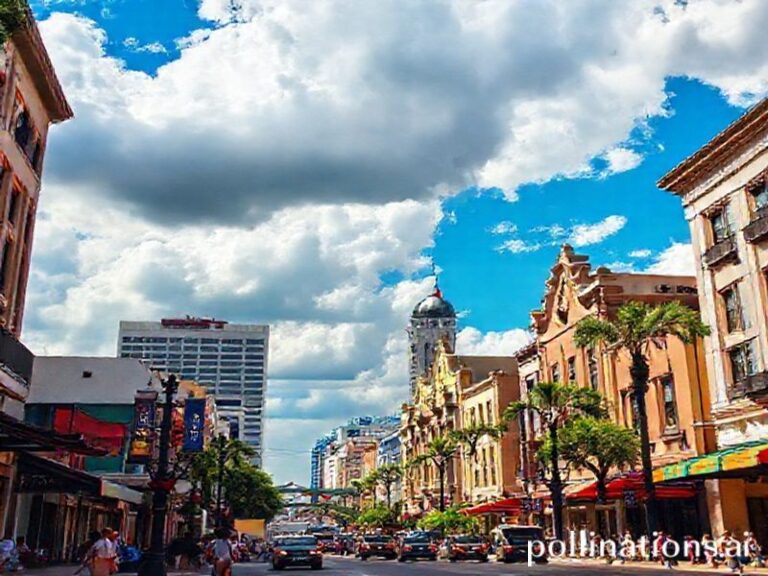The World’s Favorite Tax on Hope: How National Lotteries Became the Planet’s Shared Delusion
The Global Gospel According to Six Little Numbers
By “Lucky” Matteo Volkov, roaming correspondent and reluctant statistician
Somewhere between the duty-free cigarette counter and the overpriced espresso machine at Istanbul’s new mega-airport, I watched a Kazakh oil engineer, a Filipino nurse, and a German backpacker queue for the same thing: a slip of thermal paper promising instant transcendence. The sign above the kiosk read “Millions for Life” in nine languages, none of which bothered to translate the microscopic caveat underneath: “statistically improbable.” Welcome to the universal dialect of the national lottery, the only export that never needs a trade war because we volunteer to tariff ourselves.
From Madrid’s Christmas “El Gordo” (literally, “The Fat One,” a name that also describes most of its participants by January) to Manila’s UltraLotto 6/58, the basic recipe is identical: combine state monopoly, near-religious marketing, and the fragile optimism of people who have already tried everything except compound interest. Governments recast the raffle as patriotic duty—Spain calls ticket stubs “décimos,” tiny tithes to the nation—while quietly siphoning up to 30 % off the top for “public good.” Translation: another glass façade for a ministry you never visit.
Cross the Pacific and scratch-off theology mutates. In China, where gambling is officially frowned upon, citizens take package tours to the neon confessionals of Macau; their boarding passes double as lottery receipts for a side-draw back home. Meanwhile, the Japanese buy “Takarakuji” tickets with the same solemnity they reserve for sake ceremonies, proving that Zen stoicism and the fantasy of early retirement can coexist in the same wallet. The jackpots are smaller, but then again so is the existential dread.
Scratch beneath the glitter and you find geopolitical strategy wearing a party hat. Italy’s SuperEnalotto recently funneled proceeds into flood defenses—Venice now gambles on not sinking, which is ironic because its residents already feel underwater. South Africa’s PowerBall paid for soccer stadiums that now host migrating flamingos and the occasional political rally, a two-for-one metaphor no novelist would dare invent. Even cash-strapped Lebanon, whose currency currently doubles as origami paper, still manages nightly drawings. The prize? Enough dollars to buy a one-way ticket out of Lebanon.
Economists love to trot out the “voluntary tax on stupidity” line, but that misses the point. The lottery is the last truly democratic space where a janitor and a hedge-fund manager stand in identical suspense, their fates temporarily leveled at ₱24 or €2.50 a pop. Yes, the hedge-fund manager owns the kiosk chain, but let’s not kill the romance. In an era when billionaires shoot themselves into low-orbit vanity projects, buying a ticket is the proletarian version of a space program: a cheap launch toward zero gravity, even if re-entry is brutal.
Naturally, technology has globalized the delusion. Apps now let you bet on the Irish Lotto while sitting in a Mumbai traffic jam, the algorithm cheerfully auto-renewing your ticket until your data plan or marriage collapses. Blockchain evangelists promise “provably fair” draws, which is reassuring until you remember they also promised NFT monkeys. Still, the real innovation is psychological: push notifications that chirp “Someone just won!”—neglecting to mention that the someone wasn’t you, statistically speaking or otherwise.
And yet, cynicism curdles when you meet the winners. In rural Jamaica, a fisherman who pocketed J$180 million still repairs nets because, as he told me over a warm Red Stripe, “Money can buy a bigger boat, but not the horizon.” In Finland, a 27-year-old nurse used her €90 million to fund a mental-health startup; three years later it’s profitable and she still bikes to work through the snow, possibly the only Nordic cliché that refuses to die. These stories circulate like urban legends, keeping hope on life support and ticket sales robust.
So the wheel spins, from Sydney’s PowerBall to Brazil’s Mega-Sena, a planetary roulette where the house always wins and the players always return. Tomorrow the billboards will refresh with bigger fonts and thinner dreams, and somewhere a customs officer will wave through a container of scratch cards the way medieval clerics blessed shipments of indulgences. Same transaction, shinier wrapper.
As I filed this dispatch, the airport announcer called my flight—final boarding, Gate C23. I didn’t buy a ticket. Not because I’m above hope, but because I’ve seen the odds from 30,000 feet: they’re identical at sea level. Still, I kept the Kazakh’s discarded slip as a bookmark; even cynics enjoy a souvenir of collective amnesia. After all, the next draw is only a timezone away, and as every seasoned traveler knows, time is the one currency we never manage to win back.







